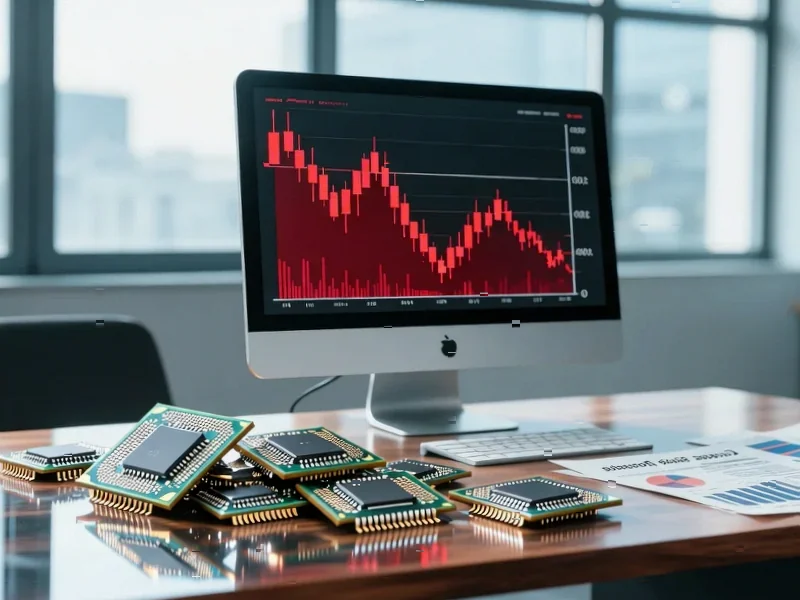According to Bloomberg Business, Asian stocks were positioned for gains Tuesday following Wall Street advances driven by Amazon.com Inc.’s $38 billion deal with OpenAI, which reignited enthusiasm for artificial-intelligence shares. Equity-index futures indicated gains in Japan—where traders were returning from a long weekend—and South Korea, while the S&P 500 and Nasdaq 100 climbed with megacap strength lifting a gauge of the “Magnificent Seven” by 1.2%. The Nasdaq Golden Dragon China Index also rose alongside Treasury yield advances and dollar gains, signaling broad market momentum following the landmark AI partnership announcement.
The Infrastructure Realignment
This deal represents more than just another AI partnership—it signals a fundamental shift in how major cloud providers are approaching the AI infrastructure landscape. Amazon’s massive $38 billion commitment to OpenAI suggests AWS is playing catch-up in the enterprise AI deployment race, particularly against Microsoft’s established Azure OpenAI Service. What’s particularly telling is the scale: this isn’t a typical technology partnership but rather a comprehensive infrastructure play that positions Amazon as OpenAI’s primary cloud provider for massive computational requirements. The timing is crucial as we approach what many analysts are calling “the deployment phase” of AI, where theoretical capabilities meet practical enterprise implementation.
Asian Market Domino Effect
The immediate Asian market response reveals deeper structural shifts in global technology investment patterns. Japan’s market reopening after a long weekend creates a concentrated buying opportunity, while South Korea’s gains reflect the region’s critical position in the AI supply chain—from Samsung’s memory chips to SK Hynix’s high-bandwidth memory essential for AI training. The Nasdaq Golden Dragon China Index’s parallel rise suggests Chinese tech giants won’t remain passive observers; we’re likely to see accelerated domestic AI partnerships and infrastructure investments from companies like Alibaba Cloud and Tencent. This creates a bifurcated AI ecosystem where Western and Chinese markets develop parallel but increasingly separate AI infrastructures.
The New Investment Calculus
For investors, the Amazon-OpenAI deal recalibrates risk assessment across multiple sectors. The 1.2% surge in the “Magnificent Seven” gauge indicates that markets are now pricing AI infrastructure as a collective bet rather than individual company performance. We’re witnessing the emergence of what I call “AI infrastructure clusters”—interdependent ecosystems where cloud providers, chip manufacturers, and AI developers move in lockstep. This creates both concentration risks and unprecedented growth opportunities. The Treasury yield movements accompanying these gains suggest bond markets are adjusting to the capital intensity of AI deployment, anticipating higher corporate borrowing for infrastructure build-outs.
Twelve-Month Outlook and Beyond
Looking forward, this deal accelerates three key trends: First, we’ll see intensified competition among cloud providers to secure exclusive or preferred partnerships with leading AI labs. Second, expect significant M&A activity as traditional tech companies acquire AI capabilities rather than build them internally. Third, regulatory scrutiny will intensify, particularly around the concentration of AI development power and infrastructure control. The most immediate impact will be felt in enterprise software and cloud services pricing, as AI capabilities become increasingly bundled with core infrastructure offerings. By mid-2025, we’ll likely see clear winners emerging in the AI infrastructure race, with significant implications for market capitalization distribution among tech giants.
Strategic Implications for Global Tech
The Amazon-OpenAI partnership fundamentally changes the strategic landscape for technology companies worldwide. We’re moving beyond the experimental phase of AI into what might be called “the infrastructure era,” where competitive advantage shifts from who has the best algorithms to who controls the most scalable, efficient AI deployment platforms. This has profound implications for startups and mid-sized tech companies that may find themselves increasingly dependent on infrastructure controlled by a handful of giants. The deal also signals that the AI market is maturing rapidly, with clear leaders emerging and the window for new entrants narrowing significantly. Companies that haven’t yet defined their AI infrastructure strategy risk being permanently relegated to secondary positions in the evolving technology ecosystem.




